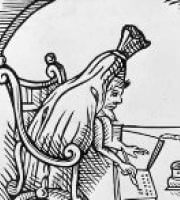by Robert Greene
Though Tytirus, the herd's swain,
Phillis' love-mate felt the pain,
That Cupid fires in the eye,
Till they love or till they die,
Strained ditties from his pipe,
With pleasant voice and cunning stripe:
Telling in his song how fair,
Phillis' eye-brows and her hair.
How her face past all supposes:
For white lilies, for red roses.
Though he found on the hills,
Such fond passions as love wills,
That all the swains that folded by,
Flock'd to hear his harmony,
And vowed by Pan that Tytirus
Did Poet-like his loves' discuss,
That men might learn mickle good,
By the verdict of his mood;
Yet old Meneleas over-ag'd,
That many winters there had wag'd.
Sitting by and hearing this:
Said, their words were all amiss.
For, quoth he, such wanton lays
Are not worthy to have praise.
Jigs and ditties of fond loves,
Youth to mickle folly moves.
And told this old said [sic] saw to thee,
Which Coridon did learn to me,
'Tis shame and sin for pregnant wits,
To spend their skill in wanton fits.
Martial was a bonny boy,
He writ love's grief and love's joy.
He told what wanton looks passes,
Twixt the swains and the lasses.
And mickle wonder did he write,
Of women's loves and their spite.
But for the follies of his pen,
He was hated of most men:
For they could say, 'twas sin and shame
For scholars to endite such game.
Quaint was Ovid in his rime,
Chiefest poet of his time.
What he could in word's rehearse,
Ended in a pleasing verse.
Apollo with his eye-green bays,
Crown'd his head to show his praise:
And all the Muses did agree,
He should be theirs, and none but he.
This Poet chanted all of love,
Of Cupid's wings and Venus' dove:
Of fair Corinna and her hew,
Of white and red, and veins; blew.
How they loved and how they greed,
And how in fancy they did speed.
His elegies were wanton all,
Telling of love's pleasing thrall,
And cause he would the Poet seem,
That best of Venus' laws could deem,
Strange precepts he did impart,
And writ three books of love's art.
There he taught how to woo,
What in love men should do,
How they might soonest win,
Honest women unto sin:
Thus to tell all the truth,
He infected Rome's youth:
And with his books and verses brought
That men in Rome naught else sought,
But how to tangle maid or wife,
With honor's breach through wanton life:
The foolish sort did for his skill,
Praise the deepness of his quill:
And like to him said there was none,
Since died old Anacreon.
But Rome's Augustus, world's wonder,
Brook'd not of this foolish blunder:
Nor lik'd he of this wanton verse,
That love's laws did rehearse.
For well he saw and did espy,
Youth was sore impair'd thereby:
And by experience he finds,
Wanton books infect the minds.
Which made him straight for reward,
Though the censure seemed hard,
To banish Ovid quite from Rome,
This was great Augustus' doom:
For, quoth he, poets' quills,
Ought not for to teach men ills.
For learning is a thing of prize,
To show precepts to make men wise.
And near the Muses' sacred places,
Dwells the virtuous minded graces.
'Tis shame and sin then for good wits,
To show their skill in wanton fits.
This Augustus did reply,
And as he said, so think I.
Last updated September 24, 2017




